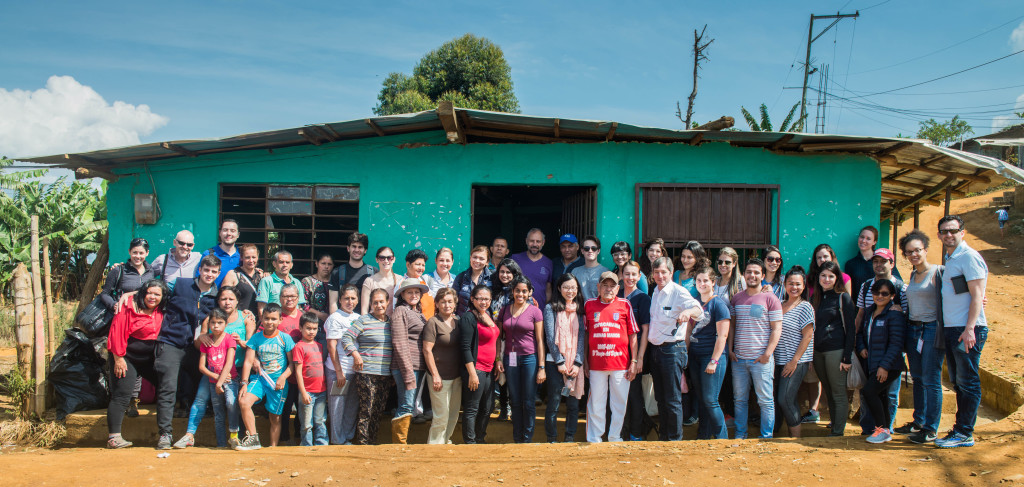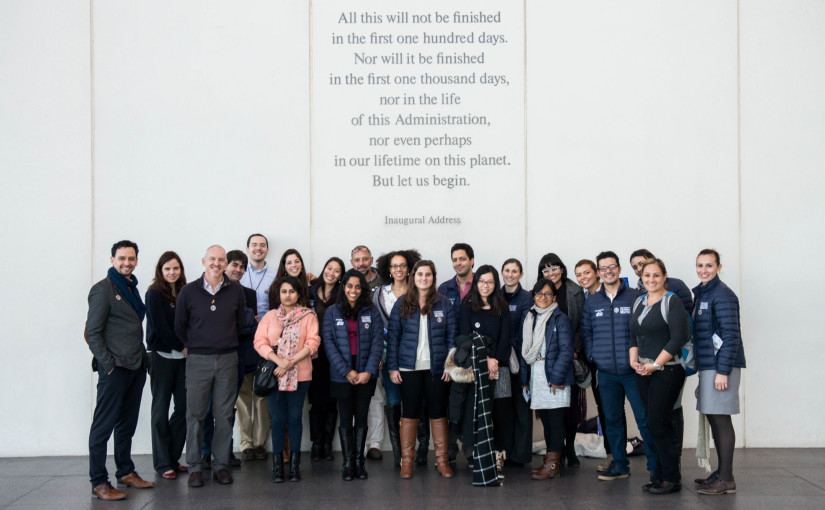This post first appeared on the Huffington Post.
Fifty-five years ago this week, braving the cold winds of a winter’s January, U.S. President John F. Kennedy delivered his inaugural address imparting upon the American people words still true today: “In your hands, my fellow citizens, more than mine, will rest the final success or failure of our course”. During times of social turbulence, the short-comings of leadership are often held at fault. And while our leaders do bear great responsibility, in equal measure, we must ask ourselves, what have we, as citizens, done to keep them accountable? Are we exercising our civic duty to vote; to analyze, discuss, and weigh in on issues; to create equitable opportunities for shared prosperity and good health? As citizens, we play an equally important role in creating a fair and just society.
In today’s interconnected world, this duty extends beyond our political borders. As ordinary citizens, it is not only our duty to hold our government accountable for foreign relations and international policies, but to complement its efforts by building relationships and understanding between the U.S. and other countries.
In that same breath to the American people, President Kennedy also offered a call-to-action still relevant for us today: “Ask not what America will do for you, but what together, we can do for the freedom of man [sic]”, what together, we, as ordinary citizens, can do for the freedom of individuals across the globe.
During the years since President Kennedy’s inauguration, Colombia has suffered a violent conflict that has left hundreds of thousands of Colombians displaced and impoverished, and the safety of many insecure. After more than 50 years of conflict, the country is now on a road to peace. Colombia is a bright spot for reconciliation and prosperity in the region and from whom we can learn regarding addressing the needs of vulnerable populations in the U.S. and whose development efforts we can hope to amplify.
For the past three weeks, guided by faculty from Harvard University and the University of Antioquia, School of Medicine, 16 medical and public health students, eight from the U.S. and eight from Colombia, have been engaged in a health diplomacy exchange through a platform of experiential learning and problem-solving. Collaborating directly with the community leaders of Granizal, a refugee settlement for displaced persons, in Bello, Colombia, students have developed practical solutions to addressing health issues prioritized by the community.
With the goal of sustainability and impact, our “Post-Conflict Colombia Public Health,” a project of the Open Hands Initiative and the Harvard Humanitarian Initiative, in collaboration with the University of Antioquia, School of Medicine, takes an innovative approach to developing culturally sensitive and relevant health solutions. It does so by 1) generating trust through relationship building between our student ambassadors and between the students and the community; and 2) through a series of lectures and roundtable discussions, accounting for Colombia’s social-political context and its perspective on healthcare, human rights, and humanitarian aid, with insight from the U.S. experience. To that end, students engaged a breadth of stakeholders: from high-level policymakers, such as U.S. Senator Edward Markey of Massachusetts and the Governor of Antioquia, Sergio Fajardo Valderrama, to urban planners, such as David Gamble and Alejandro Eschverri of the Harvard Graduate School of Design, to social thinkers, such as Julie Battilana, Associate Professor at the Harvard Business School, to local community development organizations such as La Casa de Derechos and La Fundacion Huellas. Students also had the opportunity to explore various public spaces and healthcare settings, such as the JFK Library in Boston, the Belen Library in Medellin, the metro systems in both cities, and Colombia’s premiere primary care hospital in Tamesis, to examine how these spaces inhibit or promote healthy lifestyles and behaviors.

Faculty, students, and the OHI team at Granizal, a refugee settlement in Bello, Colombia. Photo Credit: © Kelly Fitzsimmons Photography
Last Thursday, I accompanied our students and faculty to Granizal, where we hosted a health fair to address the community’s self-identified needs, which included providing a first-responders training, a deworming clinic, a workshop on education and technology, and an exercise on census mapping. Witnessing the determination and fortitude of community leaders, who despite great odds, have taken it upon themselves to transform their communities for the better, and the eagerness of our students and faculty to support their efforts, I could see President Kennedy’s words come to life. Here in Granizal, where access to government services, economic opportunities, and healthcare services are limited, I witnessed the power of what an active citizenry can do and what more can be accomplished when coupled with the support of true allies.
Our hope is that this project will continue to inform the careers of our student ambassadors and inspire ordinary citizens, wherever they are, to be leaders for their communities and their global neighbors. Getting to know our students and seeing them in action, I am confident that they are on their way to doing just that.
Lastly, we hope that this project will engender deeper connections among health professionals engaged in social development and humanitarian response and that the research, policies, and interventions it has brought to bear will inform and influence future thinking around public health policies and practices in both nations and throughout the world.
Earlier today, our students presented their policy briefs to a host of local and national policymakers, including a member of the Office of the Mayor of Bello, as well as other prominent leaders from the public, private, and non-profit sectors, in the hopes of catalyzing change and bringing their solutions to fruition. Hats off to our student ambassadors who, with open hands and open hearts, have called it upon themselves to create a healthier and more prosperous world for everyone.
